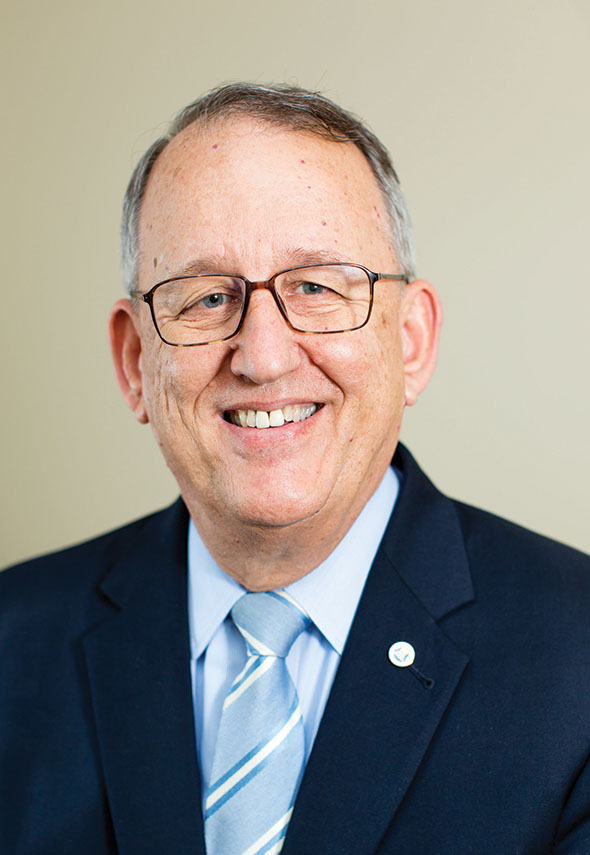Bringing Learning Into the “Light”
Posted on July 2, 2019More than a quarter of a century ago, famed journalist Charles Kuralt ’55 spoke at our University’s Bicentennial Observance opening ceremonies. In his remarks to more than 30,000 in Kenan Stadium that evening, he explained that in the 1930s Frank Porter Graham (class of 1909) transformed The University of North Carolina “by tact, diplomacy, iron persistence and steady strength of character into a model of public higher education and a light for the nation.”

Douglas S. Dibbert ’70
How can we know that Carolina continues to serve as such a light in 2019?
U.S. News & World Report’s “Best Colleges” rankings evaluate schools across 16 measures of academic quality, including everything from six-year graduation rate (17.6 percent of each school’s score) and class size (8 percent) to faculty salaries (7 percent) and percentage of first-year students who ranked in the top 10 percent of their high school classes (2.25 percent).
These rankings face skepticism, because colleges and universities know the criteria and can game the system, and a large chunk (22.5 to 25 percent) of an institution’s ranking comes not from any hard data but from “reputational” measures. The Atlantic also observes: “The rankings don’t take into account measures of the quality of education at each institution, nor is there any consideration of ‘outcomes’ (for example, what do students at College X actually learn, and do its students get jobs upon graduation?)”
Quality education requires relevant and authentic experiential learning. I was in Carolina’s first class of Richardson Fellows, a leadership program funded by the H. Smith Richardson Foundation. Along with seminars during the academic year, the dozen of us also had the opportunity for funded summer internships. I worked for a young Michigan congressman who was considering running against an incumbent U.S. senator. There were only five such successful challenges in 1966 and 1968. I researched each of those campaigns, interviewed candidates and campaign staff, and developed a report, which became part of my independent study. While the congressman decided not to challenge an incumbent U.S. senator in 1970, by the time he decided to run for an open Senate seat in 1976, I had worked in several congressional campaigns and on Capitol Hill. I managed his successful primary and general election campaigns and served several years as his executive assistant.
“Learning by doing” now manifests itself in myriad ways. Carolina students secure similar internships related to their academic focus, while others study in teams, post on class message boards, collaborate in flipped classrooms, conduct and publish original research, co-author papers with professors and study abroad — often in new cultures and communicating in different languages. Carolina continues to position itself as the light of which Kuralt spoke by empowering students with greater responsibility for their education and intentionally focusing on outcomes that may not show themselves in rankings.
Universities no longer can rely solely on technology to deliver a 21st-century learning experience. Carolina’s recently approved new undergraduate curriculum — IDEAs in Action (Identify, Discover, Evaluate, and Act) — is designed to empower students with skills necessary to thrive in jobs that may not yet exist, fostering global awareness, creativity and innovation, collaboration, flexibility, and information and media literacy. Students will be allowed to mold their educational pathways while being required to encounter new and challenging ideas. They will be equipped to think critically, define and frame questions, work collaboratively, respond creatively to changing and uncertain situations, take risks and be resilient.
We should take pride that Carolina continues to be ranked among the top 30 universities in the nation but even more confident that our alma mater remains at the forefront of education by understanding what an engaging student-learning experience can and should be, both for prospective students and prospective employers alike. Carolina continues to position itself as the light of which Kuralt spoke by empowering students with greater responsibility for their education and intentionally focusing on outcomes that may not be reflected in rankings.
Kuralt closed his remarks by affirming: “Two hundred years to the day since the founding of the first state university, we can read again the words on its seal … light and liberty, and say that The University of North Carolina has lived by those two short noble words and say that in all the American story, there is no other place like this.”
Yours at Carolina,

Douglas S. Dibbert ’70
